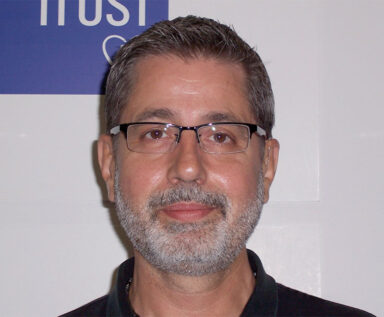HIV in Older Adults: A Scientist’s Perspective
- By Trudie Mitschang
 Mark Brennan-Ing, PhD, is a senior research scientist at the Brookdale Center for Healthy Aging at Hunter College, City University of New York, and an adjunct professor at the New York University Rory Meyers College of Nursing. Dr. Brennan-Ing’s research focuses on psychosocial issues affecting persons living with HIV and older sexual and gender minority adults. He is past president of the State Society on Aging of New York, a fellow of the Gerontological Society of America (GSA), and past board member of the New York Association on HIV Over Fifty. He was the principal convener for GSA’s HIV/AIDS and Aging interest group, a member of the American Society on Aging’s LGBT Aging Information Network Leadership Council, and 2016 chair of the American Psychological Association’s Committee on Sexual Orientation and Gender Diversity. Dr. Brennan-Ing was the lead editor on the seminal book on aging with HIV published in 2009 titled Older Adults with HIV: An In-Depth Examination of an Emerging Population, and the 2016 volume of HIV and Aging: Interdisciplinary Topics in Gerontology and Geriatrics.
Mark Brennan-Ing, PhD, is a senior research scientist at the Brookdale Center for Healthy Aging at Hunter College, City University of New York, and an adjunct professor at the New York University Rory Meyers College of Nursing. Dr. Brennan-Ing’s research focuses on psychosocial issues affecting persons living with HIV and older sexual and gender minority adults. He is past president of the State Society on Aging of New York, a fellow of the Gerontological Society of America (GSA), and past board member of the New York Association on HIV Over Fifty. He was the principal convener for GSA’s HIV/AIDS and Aging interest group, a member of the American Society on Aging’s LGBT Aging Information Network Leadership Council, and 2016 chair of the American Psychological Association’s Committee on Sexual Orientation and Gender Diversity. Dr. Brennan-Ing was the lead editor on the seminal book on aging with HIV published in 2009 titled Older Adults with HIV: An In-Depth Examination of an Emerging Population, and the 2016 volume of HIV and Aging: Interdisciplinary Topics in Gerontology and Geriatrics.
BSTQ: What physical, psychological and social impacts does HIV have on older adults?
Dr. Brennan-Ing: Biologically, HIV causes changes in the immune system and is associated with chronic inflammation, both of which are associated with greater incidence of age-related comorbidities that exacerbate declines in immune function associated with aging (i.e., immunosenescence). Psychologically, people aging with HIV have much higher rates of depression compared with noninfected adults, which is associated with treatment nonadherence and greater functional disability. Socially, older adults with HIV often lack the informal social support networks of family and friends that most other older adults rely on for caregiving and other types of assistance needed to remain independent in the community. Unfortunately, there are very few programs and services available from government, healthcare providers and community-based agencies that address the unique needs of the older HIV-positive adult.
BSTQ: What specific health issues challenge older adults living with HIV?
Dr. Brennan-Ing: The challenges of caring for the patient with HIV who is aging are similar to those of caring for other aging patients. The difference is the older adult with HIV may be confronting these issues decades earlier than their noninfected peers. The older person with HIV frequently experiences multiple comorbid conditions, leading to a greater burden of disease than among those without HIV. In fact, older people with HIV are much more likely to die from chronic conditions associated with aging than an AIDS-related condition. High levels of multimorbidity can also lead to numerous prescribed medications in addition to HIV treatment, which can result in polypharmacy and harmful drug interactions. Physicians can successfully address these issues by incorporating geriatric care principles into their practice such as using multidisciplinary care teams, involving patients and their significant others in developing a care plan, focusing on functional ability rather than trying to treat every symptom that the patient is experiencing, and employing palliative care when necessary.
BSTQ: How do age-related stigmas affect older adults living with HIV?
Dr. Brennan-Ing: HIV is still perceived as a young person’s disease, and so healthcare providers may not address sexual health and risk behaviors with older patients. Nearly one in five new HIV infections in the U.S. are detected in those aged 50 years and older. And, the older you are at time of HIV diagnosis, the more likely you are to receive a dual diagnosis of HIV and AIDS. Likewise, for the person who has grown older with HIV, internalized ageism may put them at risk for poorer physical and mental health outcomes. For example, an older person with internalized ageism may ignore signs and symptoms of disease they perceive to be a “normal” part of aging, and forgo potentially helpful or even lifesaving medical treatment.
BSTQ: What advice do you have for clinicians who treat older adults living with HIV?
Dr. Brennan-Ing: Although most of the scientific literature focuses on the problems and pathologies of the older person with HIV, we need to also be mindful that many of these individuals are long-term survivors who have successfully coped and adapted to living with this once-terminal disease. There is resilience in this population, and providers should leverage the important personal and social resources that have allowed the HIV-positive adult to face the challenges of aging to maximize clinical outcomes and a decent quality of life.